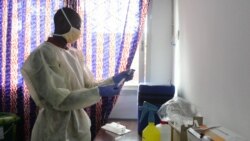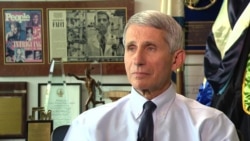Last week, the Lancet medical journal published a study showing a vaccine distributed in Guinea was 100 percent effective in protecting against Ebola.
But could the study be trusted?
The gold standard for clinical studies includes a group that receives the treatment, a group that receives nothing but regular care, and a third group that receives a placebo.
Given the ethical considerations, and the lives at risk, there was no control group, and no one received a placebo in the Guinea study. The focus was on preventing more deaths from a disease that had already killed more than 11,000 people in West Africa.
Questions surrounding the Lancet study explain why another study newly released by the U.S. National Institutes of Health will be welcomed by scientists and health care workers trying to end the epidemic that raged through three West African countries and threatened others.
Scientists at NIH conducted a study with macaque monkeys that showed a single dose of the vaccine provided 100 percent protection against the Ebola virus. That was when the monkeys received the vaccine seven days before being exposed to Ebola. If the monkeys received the vaccine three days before exposure, they were still partly protected.
This was the same vaccine people in Guinea received, VSV-EBOV. It contains a weakened live virus (VSV) that carries a protein from an Ebola virus. The result is a safe vaccine that does not make healthy people sick.
WATCH: Dr. Anthony Fauci Discuss Ebola History
Human trials not possible
Dr. Anthony Fauci, director of the National Institute of Allergy and Infectious Diseases at NIH, told VOA, "That means that you can use the vaccine late in the course of an outbreak, which is important, because that’s when you might want to use it. The other thing that was important was that it was able to protect against the multiple variants of the Ebola virus that are circulating."
Fauci observed, "History tells us that Ebola doesn’t just disappear and go away. We have had about 24 outbreaks since 1976. Most of them have been relatively minor, nothing along the scale that we’ve seen now in West Africa. All of us in the public health sector believe that there will be other Ebola outbreaks and that’s the reason why we need to be prepared.
"If we had an effective vaccine available to deploy in the very beginning of this outbreak in West Africa, we would have likely saved a lot of suffering, disease and death. So we do want to continue to make sure we have this vaccine developed fully for the next time we have to deploy it," he said.
Zaire strain
There are four different strains of Ebola virus. The one that's been circulating in West Africa is the deadly Zaire strain. Each of the four strains has different variations. This vaccine protected against the variations of the Zaire strain.
Fauci said there were other promising Ebola vaccines in various stages of development, but the number of people getting the virus has fallen to such a low level that human trials are not possible.
The World Health Organization said there were only two confirmed cases of Ebola reported in the past week: one in Guinea, the other in Sierra Leone. It's the lowest weekly total since March 2014 and the third consecutive decline in weekly case incidence.
The report doesn't mean that Ebola is going away. The WHO is still concerned that people exposed to the virus are out there.
Preparing for new outbreaks
As for what this means for scientists, Fauci said research on Ebola vaccines would not stop.
"History tells us that Ebola doesn’t just disappear and go away," he said. "We have had about 24 outbreaks since 1976. Most of them have been relatively minor, nothing along the scale that we’ve seen now in West Africa. All of us in the public health sector believe that there will be other Ebola outbreaks, and that’s the reason why we need to be prepared."
Plus, he added that the pharmaceutical companies involved in developing the vaccines want to be able to use them. Before the Ebola epidemic in West Africa started, scientists were working on developing vaccines against other deadly hemorrhagic viruses: the three other strains of Ebola, Marburg and Lassa fever.
Of the three, Lassa fever is the most deadly. It kills 5,000 people a year in West Africa, according to statistics from the U.S. Centers for Disease Control and Prevention.
"Our original purpose before the outbreak of Ebola in West Africa," Fauci said, "was to do just that: to have VSV as a vector and to have Marburg, Lassa and Ebola in there. That was the original plan. When Ebola had this historic outbreak in West Africa, we put aside the plans for the others, and we focused on developing just the Ebola vaccine because of the emergency nature of it."
The World Health Organization said most of the progress made against Ebola in West Africa was due to good prevention practices — mainly, finding people who had been exposed to the virus and isolating them to reduce transmission.
The WHO said it expected, despite the best efforts, that more people in Guinea and Sierra Leone would get the virus in the coming weeks. And, even after the outbreak is over, the virus could re-emerge. Continued vigilance and rapid response teams will still be needed.






